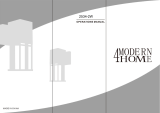
2
1.0 IMPORTANT SAFETY
INSTRUCTIONS
WARNING – To reduce risk of injury:
1. Read and understand the entire owner's
manual before attempting assembly or
operation.
2. Read and understand the warnings posted on
the machine and in this manual. Failure to
comply with all of these warnings may cause
serious injury.
3. Replace the warning labels if they become
obscured or removed.
4. This mill-drill machine is designed and intended
for use by properly trained and experienced
personnel only. The manual is not, nor was it
intended to be, a training manual. If you are not
familiar with the proper and safe operation of a
mill-drill, do not use until proper training and
knowledge have been obtained.
5. Do not use this mill-drill for other than its
intended use. If used for other purposes, JET
disclaims any real or implied warranty and holds
itself harmless from any injury that may result
from that use.
6. Always wear protective eye wear when
operating machinery. Eye wear shall be impact
resistant, protective safety glasses with side
shields which comply with ANSI Z87.1
specifications. Use of eye wear which does not
comply with ANSI Z87.1 specifications could
result in severe injury from breakage of eye
protection. (Everyday eyeglasses only have
impact resistant lenses; they are NOT safety
glasses.)
7. Before operating this machine, remove tie,
rings, watches and other jewelry, and roll
sleeves up past the elbows. Do not wear loose
clothing. Confine long hair. Non-slip footwear or
anti-skid floor strips are recommended. Do not
wear gloves.
8. Wear ear protectors (plugs or muffs) if sound
exceeds safe levels.
9. Make certain the switch is in the OFF position
before connecting the machine to the power
supply.
10. Make certain the machine is properly grounded.
11. Make all machine adjustments or maintenance
with the machine unplugged from the power
source.
12. Remove adjusting keys and wrenches. Form a
habit of checking to see that keys and adjusting
wrenches are removed from the machine
before turning it on.
13. Keep safety guards in place at all times when
the machine is in use. If removed for
maintenance purposes, use extreme caution
and replace the guards immediately after
completion of maintenance.
14. Check damaged parts. Before further use of the
machine, a guard or other part that is damaged
should be carefully checked to determine that it
will operate properly and perform its intended
function. Check for alignment of moving parts,
binding of moving parts, breakage of parts,
mounting and any other conditions that may
affect its operation. A guard or other part that is
damaged should be properly repaired or
replaced.
15. Provide for adequate space surrounding work
area and non-glare, overhead lighting.
16. Keep the floor around the machine clean and
free of scrap material, oil and grease.
17. Keep visitors a safe distance from the work
area. Keep children away.
18. Make your workshop child proof with padlocks,
master switches or by removing starter keys.
19. Give your work undivided attention. Looking
around, carrying on a conversation and “horse-
play” are careless acts that can result in serious
injury.
20. Maintain a balanced stance at all times so that
you do not fall into the blade or other moving
parts. Do not overreach or use excessive force
to perform any machine operation.
21. Use the right tool at the correct speed and feed
rate. Do not force a tool or attachment to do a
job for which it was not designed. The right tool
will do the job better and more safely.
22. Feed work into a blade or cutter against the
direction of rotation of the blade or cutter only.
23. Use recommended accessories; improper
accessories may be hazardous.
24. Maintain tools with care. Keep cutters sharp
and clean for the best and safest performance.
Follow instructions for lubricating and changing
accessories.
25. Turn off the machine before cleaning. Use a
brush to remove chips or debris — do not use
bare hands. Do not use compressed air for
cleaning.
26. Do not stand on the machine. Serious injury
could occur if the machine tips over.





















